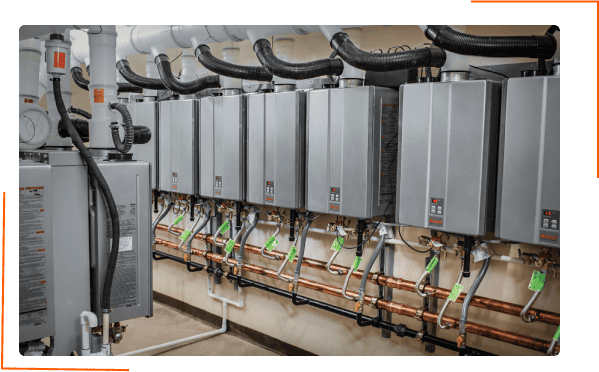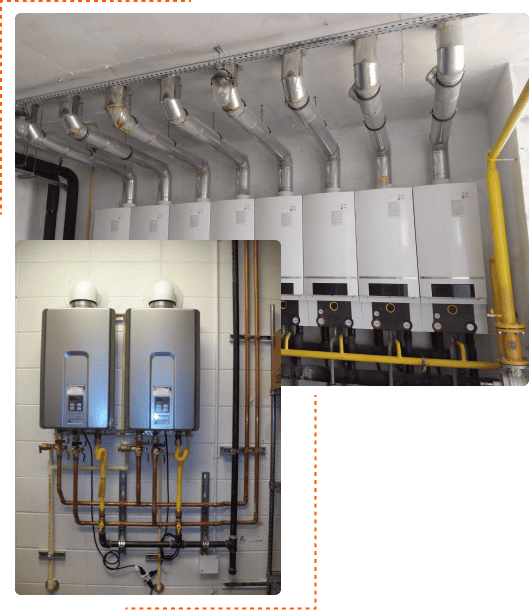Solar Water Heaters

Request Service
Enter Your Correct Detail Here
To Help You Better And Fast

(916) 999 - HEAT

Enter Your Correct Detail Here
To Help You Better And Fast





A solar water heater uses a few pieces of equipment to use the sun’s power to warm your potable water.
You’ll need a solar energy collector installed on your roof to heat your water. The panel’s heated water is sent via a heat exchanger to warm your home’s water. Storage tanks are often added to the system to make the most of the energy gathered. Based on your needs, technicians will design a custom system.
Combined, solar thermal and tankless water heaters provide a highly efficient hot water system. Your solar thermal system can’t provide you with enough hot water? No problem; the tankless heater will only use as much power as is necessary to satisfy your exact requirements.
Tankless water heaters can only heat the water to the desired temperature plus 40 degrees, so if the sun can heat your water to 80 degrees, but you need 120, you’ll still need to use an additional heat source. This setup maximizes solar power and reduces reliance on expensive fossil fuels. With the ever-changing cost of electricity, this system offers peace of mind at a reasonable price.
It is possible to recoup the cost of installing a solar water heater within a few years via savings on utility bills. At the very least, the average household's electrical use for heating water will be cut in half. For example, in Arizona, where the sun shines most of the year, homeowners may reduce their water-heating costs by as much as 90%.
Carbon emissions are widely accepted as a critical contributor to the current state of climate change. A solar water heater harnesses the sun's free and abundant energy to heat water for domestic use. You may reduce your carbon footprint by heating water with the sun instead of an electric or gas water heater. In addition to saving money on utilities, you'll also be doing your part to protect the planet.
The typical house only needs one to three solar water heater panels due to their increased efficiency. A solar water heater might be the way to go to get the benefits of solar energy without having your roof covered in panels.
Instead of turning sunlight into energy and then using that energy to heat your water, heating your water straight from the sun's rays is more efficient. Why not just heat the water in a straightforward process to save the unnecessary hassle?
It's considerably more cost-effective to use solar water heater panels than regular solar PV panels since you need fewer. Why not make an investment that helps the environment and lowers your gas or electricity expenses at the same time?

When looking at solar water heaters, there are two kinds to choose from: active and passive. Both types of solar water heaters include solar collectors and storage tanks. An active water heating system has circulating pumps and controls, whereas a passive one does not.
Direct Circulation Systems – Direct Circulation Systems work best in climates where the weather does not drop below freezing. Household water is moved around through the use of pumps and directed into the residence.
Indirect Circulation Systems – Indirect Circulation Systems work well in climates where it freezes. A pump is utilized to move a heat-conducting liquid that does not freeze through the collectors and a heat exchanger. This process warms up the water that is then transported into the house.
While passive solar heating systems are typically less costly than Active Solar Heating Systems, they aren’t as efficient. However, while they are less efficient, they usually last longer.
Integral collector-storage passive systems – Integral collector-storage passive systems work best in climates where the weather does not drop below freezing. These systems are comprised of tanks covered in a clear material to permit sunlight to warm up the water inside. The liquid from the tank is then circulated through the plumbing system. They are particularly suitable for homes with a large requirement for hot water.
Thermosyphon systems – Most Thermosyphon systems have around a 40-gallon capacity. When the user turns on a hot water tap, heated water from a collector located on the roof will travel through the plumbing system’s pipes.
There are numerous considerations for a successful solar water heater installation. Solar resources, climate, local building code requirements, and safety concerns are just some of the reasons why it’s preferable to hire a professional solar thermal systems contractor to install your system.
After the initial setup, your system will continue to function well if you do regular maintenance. Very little upkeep is needed for passive systems. Talk to your system supplier and read the owner’s handbook to learn what maintenance your active system needs. The same upkeep standards apply to plumbing and other traditional water-heating components. Cleaning glazing may be necessary for arid regions where rain is uncommon.
Simple systems only need to be serviced once every three to five years, ideally by a professional solar contractor. Most electrical systems require at least one new part every ten years. Examine the ins and outs of servicing and repairing solar water heating systems.
Solar water heaters are expected to last 20 years, which in some cases is twice as long of a lifespan compared to conventional water heaters. While that means you may not have to worry about the cost of a replacement for quite some time, there may also be a time when your solar water heater needs minor repairs or maintenance.
We recommend periodically checking on your solar water heater for shading, soiling, glazing, and seals on the collectors, as well as checking for leaks, fraying wires, and separation of seals on any part of the collector.
You may also need to replace seals or perform maintenance to prevent scaling, freezing, or corrosion.
If you’re the DIY type, you can likely find step-by-step repair instructions online, but sometimes DIY methods can make matters worse. Because of this, you should consider reaching out to a water heater repair company for maintenance or repair help. Water Heater Wiz is here to answer any questions regarding your solar water heater and is prepared to make any necessary repairs.

A solar water heater might answer your energy conservation prayers at home. Solar water heaters are cost-effective in several ways.
Energy efficiency: heating water requires a lot of power. A solar water heater may reduce your water heater’s energy use by 50–90%!
Money-saving results from lower monthly energy costs due to decreased energy use. Every kilowatt-hour (kWh) of energy you save by utilizing a solar water heater is a buck you aren’t squandering every month.
Finally, let’s pay attention to the positive effect solar water heaters have on the environment. Compared to a conventional electric water heater, a solar water heater may reduce greenhouse gas emissions by as much as four tons per year for a single home. That’s the equivalent of taking a small vehicle off the road. If you’re ready to find out if your home energy costs could be reduced by getting a solar water heater, contact Water Heater Wiz today!